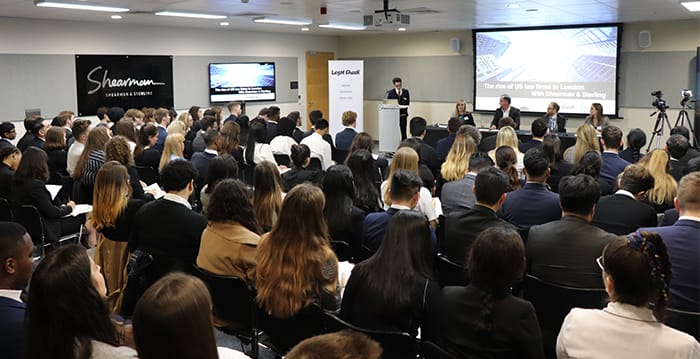Shearman & Sterling lawyers give commercial awareness master class

Four London-based solicitors at Shearman & Sterling have given a wide-ranging insight into life at an elite US law firm.
Olivia Merrett, an associate in the firm’s financial institutions advisory and financial regulatory team; Iain Elder, a partner specialising in project development & finance; Jonathan Swil, counsel in Shearman & Sterling’s litigation department, and Michèle Smith, an associate in its finance group, appeared together in a panel at a recent Legal Cheek-Shearman & Sterling event at the firm for over 100 students.
Responding to students’ questions, they explained how US law firm culture differs to magic circle firms, gave a sense of the type of work they typically do, highlighted qualities needed to get ahead in this environment, and looked back on their own careers to give advice to the next generation of students. Their best bits are below.
US law firm culture
US law firms in London typically work in smaller teams, with a lower ratio of associates to partner, meaning junior lawyers tend to do more — from high level drafting and liaising with the client, to getting their hands dirty on the grunt work.
“A more flexible, more agile environment,” is how Jonathan Swil, counsel in Shearman & Sterling’s London litigation team, but previously an associate at a magic circle firm, described the vibe. “Ultimately for me it’s more fun,” he added.
Not that US firms are all the same. A common misconception, for example, is that they all operate an ‘eat what you kill’ policy where partners are rewarded according to how much business they bring in. Some do, others, like Shearman & Sterling, don’t, opting instead for a more collegiate model.
“I wouldn’t want to work for a firm that operates on an ‘eat what you kill’ basis,” said Shearman & Sterling project development & finance partner Iain Elder. “Within an organisation that is successful for the long term you need a sense of cooperation, with referrals of work to different departments so that the best positioned lawyer within the firm is handling the appropriate matter.”
Training is another area that can vary widely. While it’s probably fair to say that most US firms in London take a more ‘hands on’ approach, expecting rookies to, as associate Michele Smith put it, “learn by doing”, there are many gradations of that principle.
At a well established London office like Shearman & Sterling — which has been in the UK capital since 1972 and takes on 15 trainees a year — there is a highly developed training infrastructure that operates in a similar way to leading UK firms with role specific training and broader training covering softer skills.
“It’s a myth that US firms take training less seriously,” said associate Olivia Merrett, pointing to the fact that the majority of US firms recruit newly qualified solicitors exclusively from their trainee pools rather than looking to fill these roles externally, which marks a change from the earlier days of US firms in London when they would look to recruit most of their junior lawyers from UK firms.
The work
Elite US firm likes Shearman & Sterling are well known for their private equity practices, which have performed extremely well in recent years, as part of a shift — hastened by the 2008 financial crisis — in the world of finance away from banks to alternative sources of capital. According to Milken Institute data, between 2000 and 2018 the number of private equity-backed companies in the US rose from less than 2,000 to nearly 8,000.

Many of these deals are highly complex and international. Often they need to be done in short time frames. And this is where Shearman & Sterling comes in. “High value deals, which are not cookie cutter, is what we specialise in and where we add value,” said Smith.
Other Shearman & Sterling strengths include high yield — a fast-growing area which features complex leveraged finance transactions, requiring the best legal minds. The firm has scooped ‘High Yield Team’ of the year two years running at the International Financial Law Review (IFLR) Awards. “The office perspective here is very much a global one,” explained Elder, “and many of us are fortunate to travel extensively to very interesting jurisdictions as part of our work”.
Looking ahead, Shearman & Sterling is bulking up its London litigation practice — hence its recent hire of Swil — perhaps with a view to a turn in the business cycle, as Western economies continue to enjoy one of their longest expansions in history.
Tech
US law firms have been talking less about tech of late than their UK counterparts. Why is that? “Tech is helpful in an increasing number of ways including high volume, lower margin work but that is not a business model which we follow,” said Elder.
However, Shearman & Sterling has invested heavily in legal project management to help allocate work more efficiently and give clients greater transparency and a better service. “On the fringes tech can certainly improve what you do but it can’t alter the fundamental that this is a people-based business,” said Swil.
Entrepreneurial mindset
One of the secrets to success for building a commercial legal career is to look to the opportunities in events outside your control — Brexit being a good example.
“A London-based competition lawyer could look at Brexit and say that their European anti-trust business is effectively destroyed by it, or they could look at Brexit and see a huge opportunity for them as the UK has to create its own competition law regime. It’s a question of mindset,” said Elder.
What's trainee life like at Shearman & Sterling?
A key differentiator between magic circle and US firms is that our trainees are encouraged to be entrepreneurial, explains Shearman & Sterling counsel Jonathan Swil
Posted by Legal Cheek on Wednesday, December 18, 2019
The speakers agreed that being adaptable, and ready to take your chances, could become even more of a differentiating factor over the years ahead as the world enters a period of heightened uncertainty amid political upheaval in major economies and growing international trade tensions.
Advice
The session concluded with the chair asking the speakers to offer one piece of advice to their law student selves. They responded as follows:
Merrett: “Don’t have too set an idea of how you want your career to develop. Be flexible and open to new opportunities.”
Elder: “Be open minded. I went into my training contract wanting to be an IP lawyer but as it turned out I wasn’t offered a seat in IP and in any event realised that I loved transactional work.”
Swil: “Be open minded, but never stop thinking about where you want to go next. Think ahead and be strategic.”
Smith: “Go into law with your eyes wide open. Research firms, get to know their values and culture. Find a firm that is the right fit for you.”


